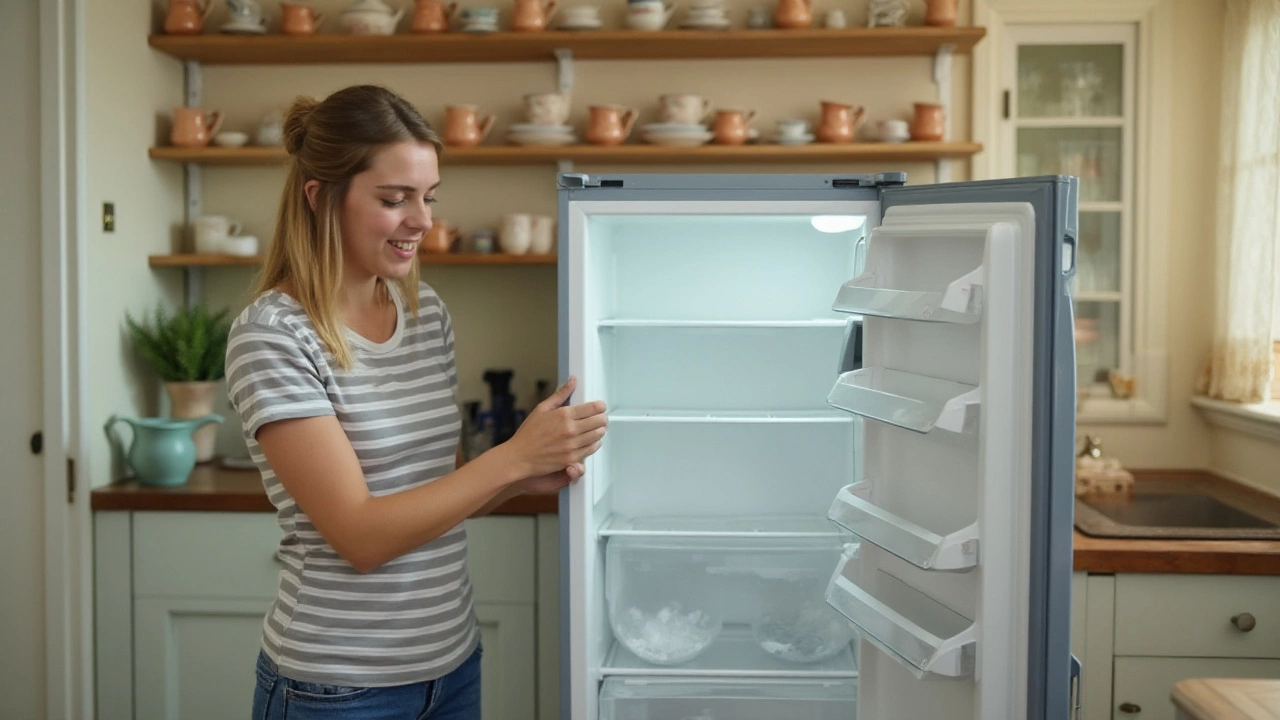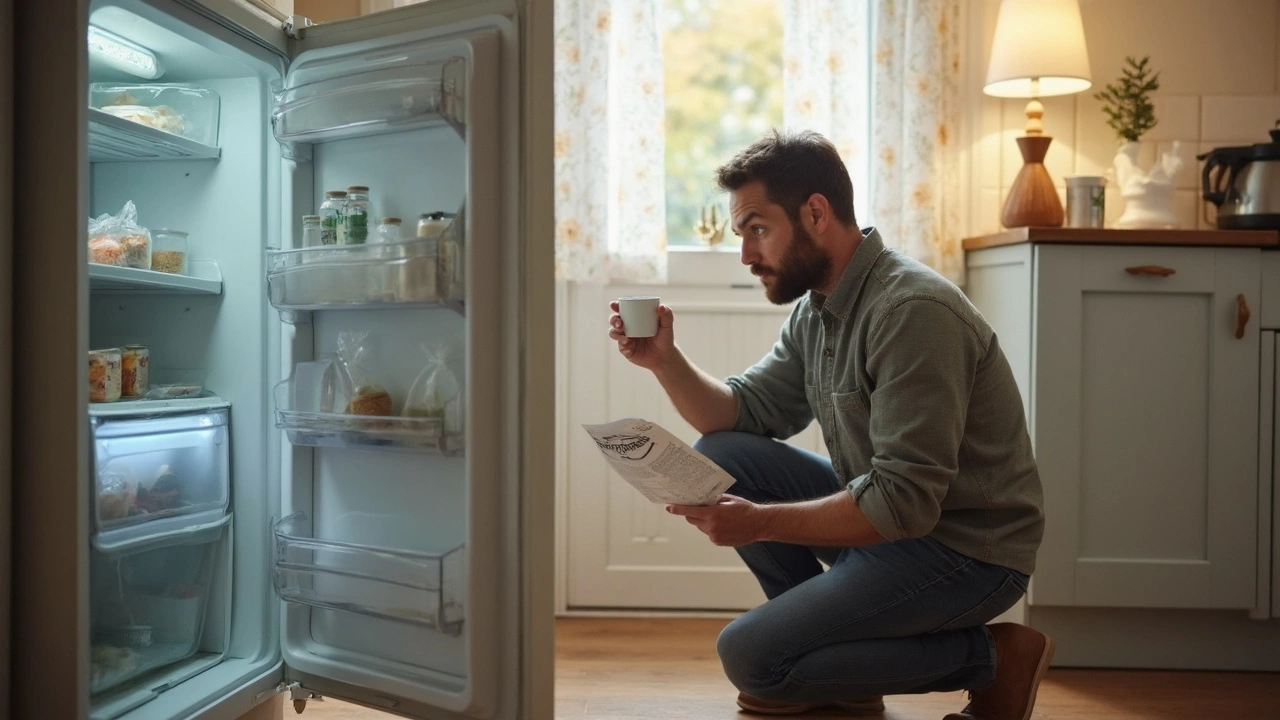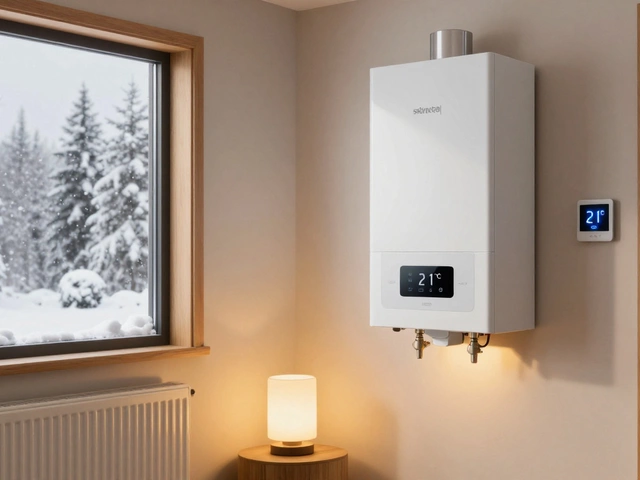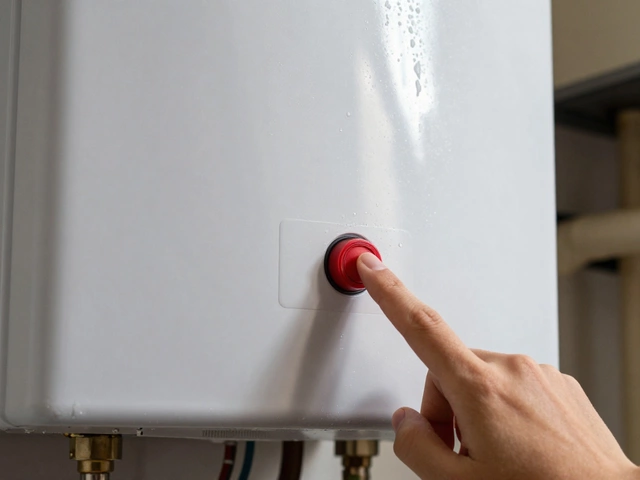When your freezer starts misbehaving, leaking puddles on your kitchen floor or refusing to stay cool, your first thought might be a costly repair or replacement. The heartbeat of your freezer's cooling system, the compressor, is often the suspect. So, the big question arises—should you replace the compressor or start fresh with a new unit?
Understanding these scenarios can save you money and headaches. In this article, let's unravel the mystery behind the function of a freezer compressor, signs of its failure, and whether investing in a new one is a sound financial decision. We will also touch on energy efficiency advantages and when to call in a pro. Stick around to make the best choice for your trusty appliance.
- Understanding the Role of a Freezer Compressor
- Signs Your Freezer Compressor Needs Replacement
- Cost Considerations and Comparisons
- Energy Efficiency and Environmental Impact
- DIY Tips and Professional Help
- Making the Final Decision
Understanding the Role of a Freezer Compressor
The compressor in a freezer acts like the heart of the unit, diligently pumping refrigerant through coils and keeping our ice cream and frozen peas at just the right chill. This crucial component works by compressing the refrigerant gas, which is typically Freon, turning it into a high-pressure state that travels through the condenser coils. Here, the heat extracted from your freezer's contents is released outside the appliance. A successful release cools down the gas, turning it back into a liquid as it flows into the evaporator coils inside the freezer.
It may seem like magic, but this is a delicate balance of thermodynamics. What's interesting, though, is how the compressor works in close cooperation with the thermostat and sensors ensuring the freezer maintains a stable temperature. When temperatures start to rise even slightly above the desired level, the thermostat senses it, signaling the compressor to spring into action. On average, a compressor runs for about 20-30 minutes every hour, depending on its settings and the ambient room temperature.
The Importance of Functionality
Without a properly functioning compressor, a freezer can quickly become a pantry nightmare. For instance, a study by the Energy Information Administration suggests faulty freezers can waste energy, accounting for up to 15% of total household electricity consumption. The compressor's task is arduous, as it must withstand fluctuations in electrical supply, variations in ambient temperature, and sometimes years of dust accumulation. With such constant pressure on its shoulders, wear and tear is a common complaint among old models.
According to John Smith, an appliance technician with over 20 years of experience, "A well-maintained compressor goes unnoticed because it's doing its job right. However, the minute it starts to fail, everything in your freezer is at risk." When understanding what's at stake, it becomes clear why taking care of this component is more than just a technical concern; it's an essential part of household management.
"A repair here and there can certainly keep the machine running smoothly, but knowing when to replace components like the compressor is crucial for efficiency," says energy expert, Maria Lopez. "Ignoring early signs of failure can lead to bigger problems down the line."
What Affects Compressor Longevity?
A variety of factors can affect how long a compressor lasts. Regular maintenance is usually the best way to ensure longevity. Clean the coils regularly, monitor the temperature settings, and ensure there is sufficient space for ventilation at the back of your appliance. Each adjustment helps reduce the workload on your freezer's compressor and may extend its lifespan. Also, knowing how to identify early signs of trouble can make all the difference in acting swiftly. If you notice that the motor is running constantly without achieving the necessary coldness, it might be an indicator that your compressor is struggling to keep up.
By understanding and respecting this component, you're investing not only in a cooler kitchen climate but also potentially enhancing the energy efficiency of your home. For those who find themselves in two minds about repair versus replacement, clarity comes by recognizing the compressor’s pivotal role in maintaining temperature and energy use, ensuring you won't ever have to eat defrosted turkey again.
Signs Your Freezer Compressor Needs Replacement
Understanding when your freezer's heart—the compressor—needs replacing can prevent a complete appliance meltdown. The first sign to watch for is if the freezer isn't reaching the desired cold temperatures. Without the compressor working efficiently, home appliances like your freezer struggle to maintain coolness, putting stored foods at risk of spoilage. If you find yourself adjusting the thermostat frequently with no noticeable impact, the compressor might be the culprit behind this inconsistency.
The second red flag is strange noises. Appliances often speak to us with hums and buzzes, but if the freezer starts producing loud clunking noises or rattles more than usual, it's calling for help. These noises often signal internal wear or failure in the compressor itself. Sometimes, this is accompanied by the freezer's exterior feeling warm or hot, which indicates the cooling system isn't circulating air as it should. According to a respected source in the industry, “Ignoring these sounds can lead to more serious damage”—and costly repairs.
Another common sign is the dreaded energy spike. When a freezer compressor is on the fritz, it tends to consume more electricity as it tries harder—and often in vain—to maintain the required temperature thresholds. Keeping an eye on your energy bill can offer clues about compressor health. A sudden jump in energy efficiency can point to underlying issues that the compressor is facing.
Visible signs of failure shouldn't be ignored either. This includes noticing excessive frost build-up inside the freezer or the appearance of ice on the freezer walls. Such issues often stem from compressor cooling problems, where it fails to regulate temperatures properly, leading to uneven cooling and ice development.
Finally, the age of your freezer can often dictate the necessity for a compressor replacement. Most freezers have a lifespan of around 10 to 15 years, and if yours is approaching that age, it's more prone to malfunction. Replacing a compressor in an older model might cost just as much or more than purchasing a new, energy-efficient unit. A guide from a reputable appliance service suggests performing a cost-benefit analysis before making your final decision.

Cost Considerations and Comparisons
When it comes to deciding if you should swap out your freezer compressor, the cost is usually the first aspect that needs examining. Replacing a compressor can be quite an investment, with prices ranging between $200 and $650 just for the part itself. Add to that the labor, typically between $100 and $200, and you’re looking at a hefty bill. These fees can vary depending on your location and the make and model of your freezer. It’s wise to gather a few repair quotes before making a decision. In some cases, repairing your trusty old freezer might end up costing nearly as much as purchasing a brand new one. Knowing the right time to repair over buy can be instrumental in keeping your budget intact.
Age is a significant player in this decision-making game. If your freezer is over 10 years old, you might be better off investing in a new unit. Appliance lifespan is not infinite, and home appliances like freezers depreciate over time. Once they reach a certain age, continuous repairs might not be worth it. Instead, investing in a newer, energy-efficient model might save you money in the long run, both on repairs and monthly utility bills. Many newer models come with advanced energy-saving features, which can be appealing from both cost and environmental perspectives.
"Repairing appliances older than a decade might be like putting a band-aid on a problem that requires stitches. Consider new options if yearly repairs become a routine," says Amelia Jennings, an experienced appliance technician.
Another factor to think about is the energy efficiency of your current freezer versus a potential replacement. Older models often consume more electricity, leading to higher energy bills. By upgrading to a more energy-efficient model, you might reduce overall electricity consumption, leading to savings that might help offset the initial purchase cost over time.
Consider these additional questions to guide your decision: Where do you live, and what's the price of electricity in your area? Energy expenses vary by location, affecting how much savings a new, energy-efficient model will bring. Additionally, do you experience frequent blackouts or power surges? These can negatively impact appliance longevity, meaning ongoing repairs might be inevitable. By weighing these factors honestly, you can make a well-informed decision, ultimately saving you money and headaches in the long term.
Energy Efficiency and Environmental Impact
In recent years, the growing emphasis on energy efficiency has trickled into every household corner, including appliances like freezers. Replacing a freezer’s compressor not only rejuvenates its cooling abilities but can also enhance its energy efficiency, leading to reduced utility bills. A new, modern compressor often uses less electricity to maintain cooler temperatures, which is a vital consideration for both cost savings and environmental sustainability. When considering compressor replacement, it's worth noting that older models were not designed with today's environmental consciousness. Nowadays, manufacturers prioritize energy efficiency by utilizing advanced technologies and eco-friendly refrigerants.
Considering the environmental impact, upgrading to a new compressor within an aging freezer can significantly reduce its carbon footprint. The improvements in how compressors are engineered now mean that they often require a lower volume of refrigerants that are less harmful to the ozone layer. Not all freezers are built on a framework that supports such advancements, so ensuring compatibility and the nature of improvements offered by the compressor is crucial. Energy Star compliant compressors, for instance, can lower freezer emissions and align better with sustainable living practices.
One striking aspect that often goes unnoticed is how modern compressors handle variations in voltage. This adaptive quality not only extends the lifespan of the unit but also optimizes electricity use, saving energy long-term. It's essential for consumers to understand that taking care of global resources starts with small actions at home. Compressors play a strategic part in how much energy a freezer uses, directly impacting greenhouse gas emissions. The benefits of swapping out that weary old compressor for a newer, greener one are measurable both in terms of environmental impact and personal finance.
"A small change in the internal workings of appliances like freezers can lead to significant ecological benefits. Embracing energy-efficient technology helps combat climate change by reducing fossil fuel consumption," according to a report by the International Energy Agency.
For those interested in the nitty-gritty numbers, here's a quick breakdown: replacing an older compressor can cut energy usage by approximately 15-30% depending on the model. This can translate to substantial savings on electricity bills over time, making the initial investment worthwhile. For instance, if you're initially hesitant about the upfront cost of a new compressor, it's smart to weigh it against the potential savings on energy costs in the years to come. In doing so, it's easier to grasp the comprehensive benefits of investing in a high-efficiency, environmentally-friendly compressor, and it turns the task of appliance repair into a meaningful contribution towards reducing your carbon footprint.
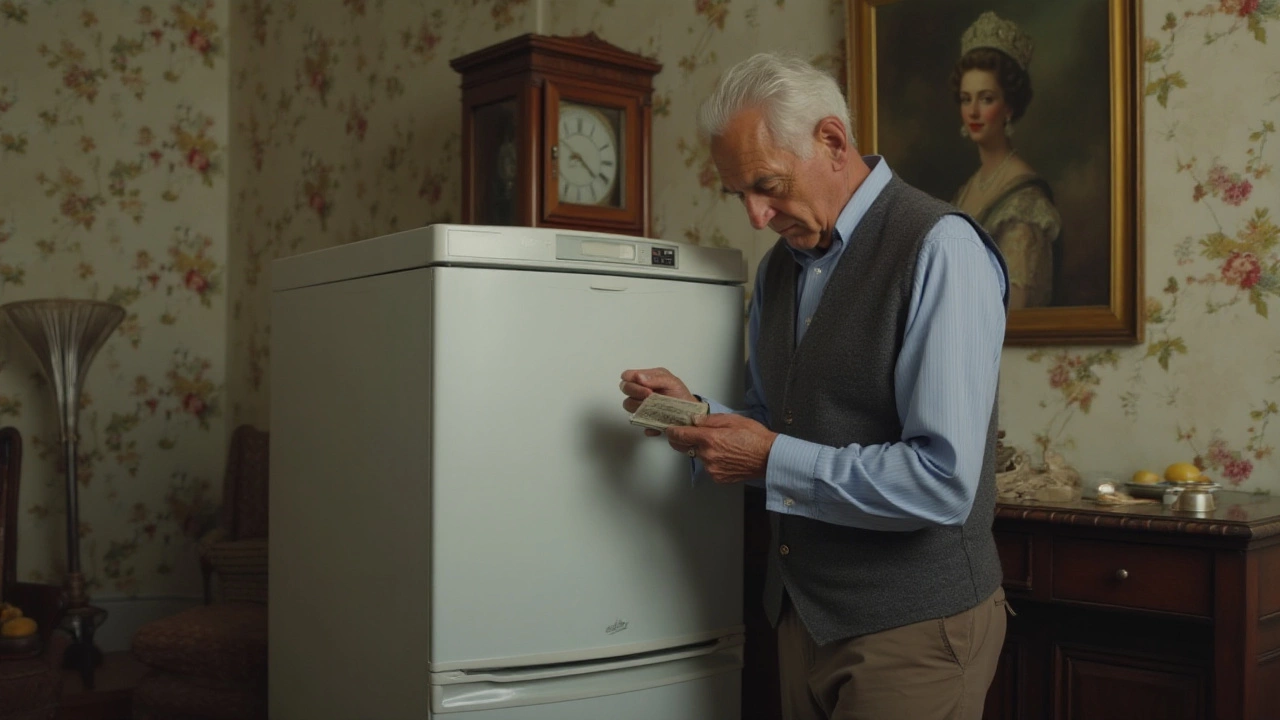
DIY Tips and Professional Help
When facing the daunting task of freezer repair, the idea of replacing the compressor yourself might seem like a thrilling adventure for the brave at heart. Yet it's crucial to tread carefully. This vital component takes charge of the cooling function, which means tampering with it isn't to be taken lightly. Before anything else, ensure you unplug the appliance to avoid any mishaps. Personal safety should always be the top priority. If you have a background in appliance repair or if you are particularly handy, then tackling the replacement yourself might save you a good chunk of cash.
In any DIY project, having the right tools at your disposal is essential. For compressor replacement, you'll need a socket wrench set, a spanner set, and gasket sealant, among other things. Make sure you double-check that the new compressor is compatible with your freezer model. Misalignment here could lead to wastage of time and resources. Following video tutorials or guides specifically tailored to your freezer make can also prove invaluable. However, if at any stage you're uncertain about a proceeding step, it's wise to pause and consult an expert.
Speaking of professionals, enlisting one might be an ideal route, especially if your freezer is still under warranty. Manufacturers typically recommend using a licensed technician for repairs, and sometimes doing the DIY route could void the warranty. The upside of a professional repair is the quality assurance and peace of mind it brings. These technicians possess deep knowledge, handling intricate electronics with finesse while ensuring the job is done impeccably well.
As quoted by Marcus Robinson, a seasoned professional with over two decades in appliance repair,
"A flawed DIY compressor replacement can sometimes cost more than what you might have saved. It's vital to know your limits."This insight into the balance between cost and expertise is something to consider keenly.
In deciding between DIY and professional help, weigh in factors like your skill set, budget, and time constraints. Don’t hesitate to get repair quotes from several services to compare prices and the scope of work. Engaging with community forums can also offer helpful insights and real-life experiences from others who've been in your shoes. Remember, while the DIY route can be empowering, knowing when to step back and let a professional take over is equally wise. It's not merely about saving on expenses, but securing the longevity of your beloved kitchen companion.
Making the Final Decision
As you stand at the crossroads, deciding whether to replace that crucial freezer compressor, it's essential to weigh both sides of the scale. The decision is not simply a matter of fixing something broken; it's about the long-term implications of maintaining one of your household's unsung heroes. First, think about the age of your freezer. If your appliance is already well into its golden years, say over a decade old, replacing the compressor may not be a wise investment. On the other hand, if your freezer is relatively young and otherwise in good shape, a new compressor might just be the perfect cure to extend its life for years to come.
Price is another vital consideration. The cost of replacing a compressor can range from $200 to $500, including labor. For some, this is a reasonable price to preserve a beloved appliance that sees constant use. For others, it might just make sense to invest in a new freezer, especially considering the energy-efficient models on the market today. As per a study conducted by the Energy Efficiency Agency, modern freezers use up to 40% less energy compared to those from the previous decade. This not only reduces your electricity bill but also lessens your carbon footprint, providing long-lasting environmental benefits.
When you're contemplating such a decision, listening to experts can often provide clarity. A renowned appliance technician, Mike Jameson, sums it up well when he says,
"If that compressor is the only thing left of its kind in an otherwise sound appliance, go ahead and fix it. But, if other parts are starting their slow demise, opting for a new freezer might just save you time and trouble down the road."Mike's advice suggests looking beyond the immediate need and considering the bigger picture.
Consider Your Options
Here are a few points to ponder before making your decision. First, evaluate your warranty. If your freezer is still under warranty, chances are the compressor replacement will be covered, reducing your out-of-pocket expenses. Another consideration is how essential the freezer is to your daily life. If you rely heavily on it for food storage, having a reliable appliance is non-negotiable. Imagine the inconvenience of a sudden breakdown just before an important holiday gathering! Relinquishing that potential stress might redirect you toward replacing rather than repairing an unreliable model.Another aspect is whether you're inclined towards sustainability. Repairing instead of replacing can often be a more environmentally responsible decision, leading to less landfill waste. However, as mentioned earlier, newer, energy-efficient appliances have their own environmentally friendly perks. Looking at the trade-offs, prioritizing your home's energy consumption savings and planetary health ultimately falls on you. Freezer maintenance plays a vital role here, regardless of whether you choose to replace or repair. Regularly cleaning coils and ensuring proper sealing can do wonders to prolong the life of any appliance.
To simplify, here's a brief checklist:
- Is the freezer under warranty?
- How old is the appliance?
- Can you afford the repair costs?
- How important is energy efficiency to you?
- Do you desire a sustainable solution?
Putting pen to paper with pros and cons may help solidify the decision. No two households are alike, and the best choice reflects personal circumstances and values. Remember, a well-informed decision today ensures peace of mind tomorrow, freeing your time and resources to enjoy the things that truly matter.

